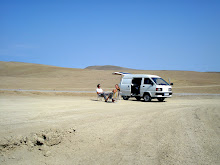Jag skriver det har pa svenska sa att de som eventuellt kan bli sarade av det inte forstar. Vi har nu rest genom alla de foredetta jugoslaviska republikerna, jag borjar sa sakta bli en riktig Balkanexpert. Man far saga att Jugoslavien och krigen lamnade mycket skit efter sig. Det ar val nastan sa langt bort fran Sverige man kan komma inom Europa men det ar enda svart att forsta att sadan fattigdom och odelaggelse fortfarande finns i denna varldsdel. Forutom Kosovo tror jag att sodra Serbien ar varst, hela samhallet har stannat upp, inget hander, ingen ser framat, alla ar bittra.
Den familj vi bott hos i Nis ar ett exempel som jag kunnat narstudera. Peter sa att deras liv stannade 1991 nar de flyttade tillbaka till Serbien fran Slovenien och det stammer. Bilen ar 17 ar gammal, stereon ar kopt innan -91, halva huset ar byggt da (den andra halvan star ofardig) hela livet star pa paus. Genom stora mutor har mamman och yngsta sonen (jamnarig med mig) fatt jobb, de tjanar omkring 100-150 euro i manaden var. Aldsta sonen ar ingenjor men kan inte fa jobb, pa 15 ar har han aldrig rest till havet eller nagonstans med sin flickvan, de har inte rad att gifta sig. Han ar trettio och maste be mamma om pengar for att kopa en kaffe. Anda vill familjen bjuda oss pa allt nar vi ar dar. Vi lyckades bjuda ut dem pa restaurang en kvall, sonerna var mycket generade och bortforklarade nar de bad att fa ta med kottet som blev over hem. (Vi fick grillkott nog for tolv personer, sallader, grillade svampar och chilis, tva flaskor vin, atta snapsar, tre ol, pannkakor mm for ca sexhundra kr.) Det var forsta gangen familjen gick ut tillsammans pa atta ar. Det ar ju sa man vill grata, fast saklart manga har det mycket varre och till exempel sitter med en badrumsvag pa gatan for att tjana en krona pa att vaga folk.
Vi hade i alla fall jattekul nar vi gick ut och drack ol med grabbarna pa kvallen.
Wednesday 25 July 2007
Serbian pork extravaganza
Kosovo
Even though we left Kosovo a few days ago I have to write something about my impressions from this strange place. In this area of ex-Yugoslavia, Kosovo seems like the most developed part. Pristina is full of new cafes and restaurants, streets are crowded with new big cars and everywhere you go you hear different languages. American, French, Slovakian, Swedish, Swiss, Finnish, the list goes on, there is military presence from almost every European country as well as American. On the other hand, if you round a corner, no pavement, no streetlight, only barbed wire. My Cesar salad lunch was the first west European food in a long time, served by a waiter who seemed extremely humble and nervous, I hope all these UN people are not acting like idiots, bossing people around. Like in Palestine it was a relief to leave, so much weapons and military trucks make you very tired.
Sunday 22 July 2007
In the army
The safest night on this trip so far was spent in Kosovo two days ago. When arriving to the village of Gračanica we discovered Swedish UN forces to be guarding the Serbian monastery. Hej! I said to the somewhat surprised soldier Sophia on patrol outside the monastery gates. We could park in their camp and sleep right next to the KFOR trucks surrounded by barbed wire, nuns, chickens and old tractors.
The Swedes invited us to join the barbecue later in the evening and we spent a very nice night drinking Peter’s Croatian Travarica, singing snapsvisor and exchanging Kosovo impressions. Thanks!! To all the nice soldiers, hope you see this. Mattias, let us know when you pass Croatia on your beautiful new bike.
Grill master and his student.
Breakfast by the barrack, and guided tour with heavy security.
Gračanica monastery
Kosovo is the cradle of the Serbian Orthodox Church and is dotted with some of its eldest monasteries. After the battle of Kosovo in 1389 when Serbs were defeated at Gazimestan by the advancing Ottoman Turks all of the frescoes in Gračanica monastery were de-eyed according to conqueror’s iconoclasm. ‘Those who wish to cut the heart from Serbians want to wipe them from this Earth. It is a battle that is not over yet’ said Orthodox Bishop on the 618th anniversary at the site of a battle that Serbs consider a heroic defeat suffered in the holy cause of defending Christian Europe from the Muslim Turks. The quote is taken from the periodical, published by the sisterhood of the Gračanica convent.
Friday 20 July 2007
Montenegran mountains
While the newspapers warned: "Serbia is turning into a desert, 43 degrees!" we spent some wonderful times up in the Durmitor mountains of Montenegro, swimming in fresh lakes and hiking in a pleasant temperature of about 25 C.
It was very beautiful and relaxing to stop for a few days and leave Shlakiyah in the camp. We also enjoyed some very nice local food and met Borat's brother who is Italian and speaks just like him, he was desperate to find "lamb cheese" the sheep version on the menu apparently didn't work.

We are now in Kosovo, more about that soon.
Wednesday 18 July 2007
Srebrenica
We visited the memorial of the massacre in Srebrenica two days after the 12th anniversary of the genocide. It was overwhelming to see the massive graveyard. 8372 people are buried there. We imagined a person standing by each stone - it would have been a huge crowd.
Janjetina
The most significant road sign in Bosnia is pointing out janjetina. Every single village we passed in this country has at least one 'restaurant' serving roast lamb = janjetina. Usually it's just the whole beast on a skewer rotating over charcoals. Some more advanced establishments also serve more advanced janjetina, e.g. lamb on steam, lamb in milk, cooked smoked lamb, knuckle from lamb or cooked lamb's head.


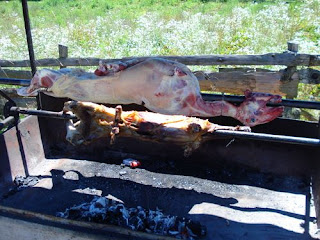
Saturday 14 July 2007
Driving far
Within 24 hours from driving over the border to Bosnia we spotted at least fifty Swedish cars on the road. It is unbelievable how many there are. Mostly new Mercedes or Volvos. Swedish cars are by far the most common with foreign registration. While having dinner at a lakeside restaurant, five Swedish cars stopped in the parking lot, none of the passengers looked very Swedish though.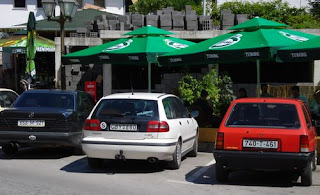
Bosnia and Herzegovina
We entered BiH from Croatia Wednesday evening. This first day of the real travel was filled with bad impressions from the war still visible everywhere along the road. We drove from Senj on the Croatian coast to Bihač in Bosnia. Inland Croatia was the worst with empty and roof-less house-ruins in every village and shell marks on the walls of schools and churches. When we entered BiH it was a bit more hopefull, more reconstruction done but still bad. Some of the bombed houses looked even worse in contrast to the new pink and white buildings. We saw cemeteries with cloned white stones all dating from 1993-95 along the road. Two girls about forteen years of age went to put lilies on one of the graves, to a father or brother maybe.
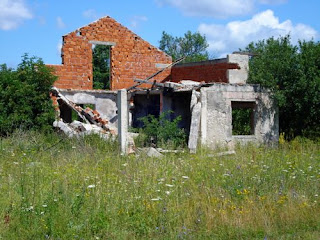
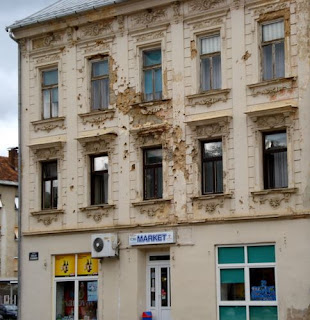
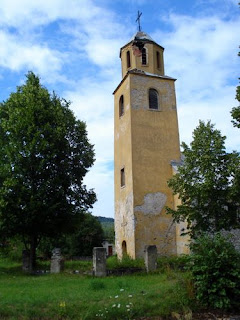
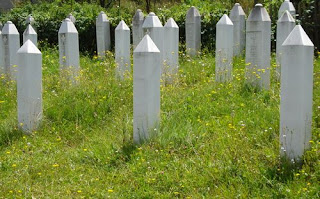
This last picture shows the beautiful landscape aswell as the men who are demining it. Signs warned us to enter the fields, "Mines!" and a white scull.
Friday 13 July 2007
Monday 9 July 2007
Istrian Farewell
Subscribe to:
Posts (Atom)
